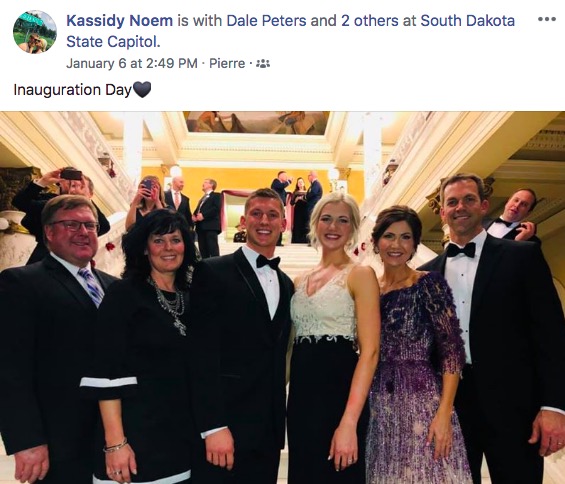Senate Bill 39, Senator Stace Nelson’s anti-nepotism bill, is a great idea. Alas, it doesn’t declare an emergency, and it gives Kristi Noem and her cabal until July 1 to hire all the children, stepchildren, siblings, parents, and in-laws they can before SB 39 would kick in.
Of course, before we pass any bill, we should get some solid data on just how pervasive is the problem the bill seeks to solve. Let’s get some testimony on how many paychecks the state writes to kin of other state employees. Get someone from the treasurer’s office, someone new who can offer a fresh look at the data, someone like…

Kyle Peters! He’s Treasurer Josh Haeder’s new finance officer and Legislative liaison, so he’s the guy we’d expect to come talk to Legislative committees about such matters. Fresh from his private-sector job at Plains Commerce Bank in Mitchell, Peters surely has little tolerance for government backroom back-scratching. Peters grew up on a farm and he likes lifting weights, so he’s clearly cut-out for the hard work of exposing nepotism and other corruption in state government.
But let’s keep those committee hearings brief. We don’t want to cut into the time Peters likes spending (according to his cached bio at Plains Commerce Bank) with “his significant other, Kassidy.”
Kassidy?


Kassidy Noem.


Yes, Kyle Peters is most definitely the guy from the Treasurer’s Office we want speaking to Senate State Affairs about the extent of nepotism in state government.
According to Open.SD.gov, Peters’s new job pays $53,000 a year.
Photo taken on stolen Paha Sapa or He Sapa land (or whatever Lakota, Dakota or Nakota people call the hills😀)!
Another photo shows trump looking like he just got outta bed. How many stylists have to get him ready I wonder? ‘Member that photo of dumb Kristi mooning on top of the Great Wall? With Rep Aaron Schock or whoever. Republicans Elected this irresponsible inexperienced uneducated (she speaks like a country bumpkin).
Yes sarge or Steve, I don’t like this clan. Sitting in front of Alex fireplace one morning 25 of ‘em moved in front for a half hour photo op. Annoying. Privileged.
Each photo left me with a response best articulated here.
Good one Kal Lis!
“Well isnt that special!” Bless their hearts, the Noem family and friends all get nice new jobs thanks to Mom.
“I’m giving him my beautiful daughter. What more does he want?” pageant queen snarky, as usual. Young Mr. Peters. She’s already begun busting your balls and it’s only beginning. Experience says, “It ain’t gonna get better for you for a long, long time. Marry her and do your best to get your bride the hell out of “Sud Dakot”. You sir, officially have a FMILFH. (future mother in law from hell)
*PS … Why do many liberal males live in SD, when it’s nearly dreadful politically, financially and climatalogically? Because, men live where their wives want to live. (Happy wife – Happy life) And, most females enjoy living near their moms.
She sounds like a slave owner “giving” away chattel. That Face Book post reveals a lethal mentality.
In my former field (developing jobs for hard-to-place job seekers) we called such employment “gimme jobs.” A relative uses strings to put a person in a job. Hey, you use whatever levers are available for people without skills.
Maybe that’s unfair to young Mr. Peters. He may have education and experience, other than bootlicking for political elites and his soon-to-me MIL, that qualifies him as a finance officer and political liaison to the State Treasurer. Generally, though, a State Treasurer was established in the SD Constitution to be independent of the Governor’s Office to provide checks and balances. Of course, the Constitution has never gotten in the way of the Republican Party corrupting and blocking those checks and balances, and Mr. Peters can be expected to provide checks but few balances to whatever cuckoo schemes MIL comes up with.
53K state job can’tn be near as lucrative as finances in private bank, even in Northern Mississippi. must be alot more to this story.
Was that rhetorical or could the young man want a threesome with mom and daughter?
“Let’s get some testimony on how many paychecks the state writes to kin of other state employees.”
I’m sure what you meant to say was, … how many paychecks the state writes to kin of elected or appointed officials.
Actually, Jean, SB 39 says “A state official or state employee, in the exercise of that person’s duty, may not serve in a supervisory capacity over, or enter into a personal service contract with” a variety of near kin, so the nepotism would apply to anyone on the state payroll, elected, appointed, or hired, who is in a supervisory or contracting position.
Special indeed, Kal Lis!
Donald, I will not that Peters at least brings some experience to the field he’s being hired to handle, unlike his future sister-in-law Kennedy, whose policy analysis position in the Noem Administration is her first real job. Kyle’s real-world experience gets him $3K (6%) more a year than Kennedy gets.
Leslie wrote:
Photo taken on stolen Paha Sapa or He Sapa land (or whatever Lakota, Dakota or Nakota people call the hills😀)!
You are welcome for the history lesson Leslie.
The Arikara arrived by AD 1500, followed by the Cheyenne, Crow, Kiowa and Pawnee. The Lakota (also known as Sioux) arrived from Minnesota in the 18th century and drove out the other tribes, who moved west.[6] They claimed the land, which they called Ȟe Sápa (Black Mountains). The mountains commonly became known as the Black Hills.
https://en.wikipedia.org/wiki/Black_Hills
All land is stolen land.
Jason makes a frequently repeated argument. That argument is flawed because it overlooks a fundamental difference in relationships among the parties.
The fundamental weakness of the the Sioux-Arikara argument is that the Sioux did not have a treaty with the Arikara. Any land taken by the Sioux from the Arikara was a result of winning battles or wars. The victorious Sioux did not violate any laws agreed to by the Sioux or the Arikara.
In the case of the U.S. and the Sioux, they too were engaged in a war over the land in question. That war was ended by the 1968 Treaty of Fort Laramie. And the U.S. Constitution defines such treaties as the law of the land. Theft reared its ugly and immoral head when the U.S. decided to violate its treaty promises and seize the land. Since this unilateral action by the U.S. violated the “law of the land,” it is reasonably characterized as theft.
bcb – I don’t intend to defend the jason or the US government with this comment, but the most recent breaking of a treaty doesn’t exactly end the conversation regarding theft. The US just stole it most recently. I don’t know the history of the land as well as you and jason appear to, but your comment seems to suggest that the sioux taking the land from another tribe through death and destruction is better than the US taking it through breach of contract. Granted, I know our ugly history and our breach of contract also involved death and destruction, but just because land is claimed through war doesn’t mean it wasn’t stolen. The prior occupants who lost the war probably feel like they were robbed. Like I said, all land is stolen; looking back one “owner” isn’t enough.
Treaty of Laramie was in 1868.
The US ceded land to the Sioux and then took it away by force. That land was supposed to be inviolate forever, which to whitey means until we want to take it back.
You know what this means? Kassidy and her boyfriend living at the governor’s mansion too.
mfi, sorry about the typo on the date – you are right -1868.
ryan, I don’t intend to judge or evaluate the morality of taking land, I only distinguish between theft, which is the violation a prior law that has been agreed upon by all parties, and taking land by conquest without violating an agreed upon law.
I am certain that the people who have lost land because they were conquered aren’t particularly happy about it, yet only those in a fantasy world would reasonably call it “theft,” given the above definition.
As for incorrect comments by Jason or others, it seems reasonable and appropriate to respond by calling out the fantasy. This means using terms such as “theft” as they are, and have been, defined by our dictionaries and common usage, rather than allowing the use of undefined speculation or hyperbole.
I reject fantasy propaganda about history and current events will do my best to call out fantasy statements when I read them. Reality and truthfulness still seem important values worth attempting to defend, especially in this current Trumpist world where so many act as if truth is dependent on desire, opinion or what someone like Trump, Alex Jones, Hannity, et al, claims to be true. For an excellent analysis of the issue and a truly inspiring read, check out “Fantasyland, How America Went Haywire,” by Kurt Andersen. (Random House 2017).
The problem with taking one singular quote from Wikipedia regarding the pre-settlement history of the Black Hills, and applying it to treaty claims, is that it lacks context. It is a single data point taken out of context meant to support a narrative that the Sioux have no claim on the Black Hills.
To say that there are other tribes that have a more legitimate claim on the Hills is to not understand the nature of “plains indian culture”.
The Sioux didn’t “steal” the land from Tribes that were hunkered down in the Hills for many generations. They did dominate many of the tribes in the region, and pushed them to the margins, but those other tribes were also moving around too. All of the tribes in this region were nomadic or semi-nomadic. Territorial ownership between tribes on the great plains was very dynamic and constantly changing. The tribes were following bison herds, and warring. Many of them planted corn, beans and squash in floodplains, then spent the summer hunting, covering great distances, then would come back to harvest in the Fall.
The great distances covered in a short time were unprecedented in Native American history, and driven by the fact that they had horses (from the Spanish), starting in the 1600s, and spreading throughout the plains by the 1700’s. The horse revolutionized plains culture and brought about a renaissance of sorts on the plains, with plentiful bison. Many tribes moved into the plains and appropriated plains culture from the existing few tribes that were there before.
The Cheyenne – Originally from northern Minnesota, just like the Sioux.
The Crow – Originally from what is now Ohio.
The Kiowa – likely lived in the upper Missouri River and Yellowstone River area, later in eastern Colorado.
The Pawnee had been one of the original plains cultures, in the central plains, living a more sedentary life before horses changed everything. The Arikara were similar, but more in the northern plains.
So at what point in their migratory history should we “freeze time” and say “this is the land you have a right to” Should we take all the tribes that were crammed into Oklahoma, and redistribute lands to them in the eastern US, which was actually their homeland?
Thanks, Steve, for the history lesson.
Sorry, I meant “Thanks JASON for the history lesson”
The United States Government made a deal, a real estate deal with Native’s in a private treaty. The United States Government did not recognize any other claims to the land’s other than those with whom they were making the real estate deal with. Believe it or not, we still do that to this day in sales and it is called a private treaty (the agreement for the sale of a property at a price negotiated directly between the vendor and purchaser or their agents.) It really doesn’t get clearer than what we still practice today.
Now if it all became serious. Today’s owners can only go back to the ownership they claim with the title searches they can locate at the county courthouses. In West River, those title searches only go back to the time of statehood. The Native title search goes to 1868, no one in West River, that is not Native can provide proof of ownership before that. The Natives called it The Art of the Steal.
I have to correct my original comment. Although the taking of the land from the Sioux seems closer to a theft than the conquest or control of the land by the Sioux over the Arikara et. al, in 1980 the SCOTUS ruled that it was a “taking” of the land without paying just compensation as required by the 5th Amendment.
In other words, it was an unlawful exercise of the power of eminent domain. And as pointed out earlier, the Sioux’s prior control of the land violated no existing law. Had the Sioux acquired this land unlawfully, they would not have had a valid title and would not have been entitiled to compensation. Possession premised on theft of property does not convey title.
https://supreme.justia.com/cases/federal/us/448/371/
Worse than who owned that land 200 or 600 years ago is the clearly illegal ATV path ripped through the woods now owned by all of us, damaging the resource and probably harming small animals.
I wish the breaking of treaties with native people was the worst thing our government had ever done.
I wish Noem would promise to hire one Native person for every relative and friend she hires for state government. She might cut reservation unemployment in half.
In jest, I would like to point out that doing so would still be basing state employment decisions on irrelevant traits rather than focusing on the merits of people actually qualified for the job.
Tag.
Let’s start from when the Continents were connected.
Hiring based on race is racism.
At least Jason concedes with his distractions that hiring Kyle Peters is nepotism.